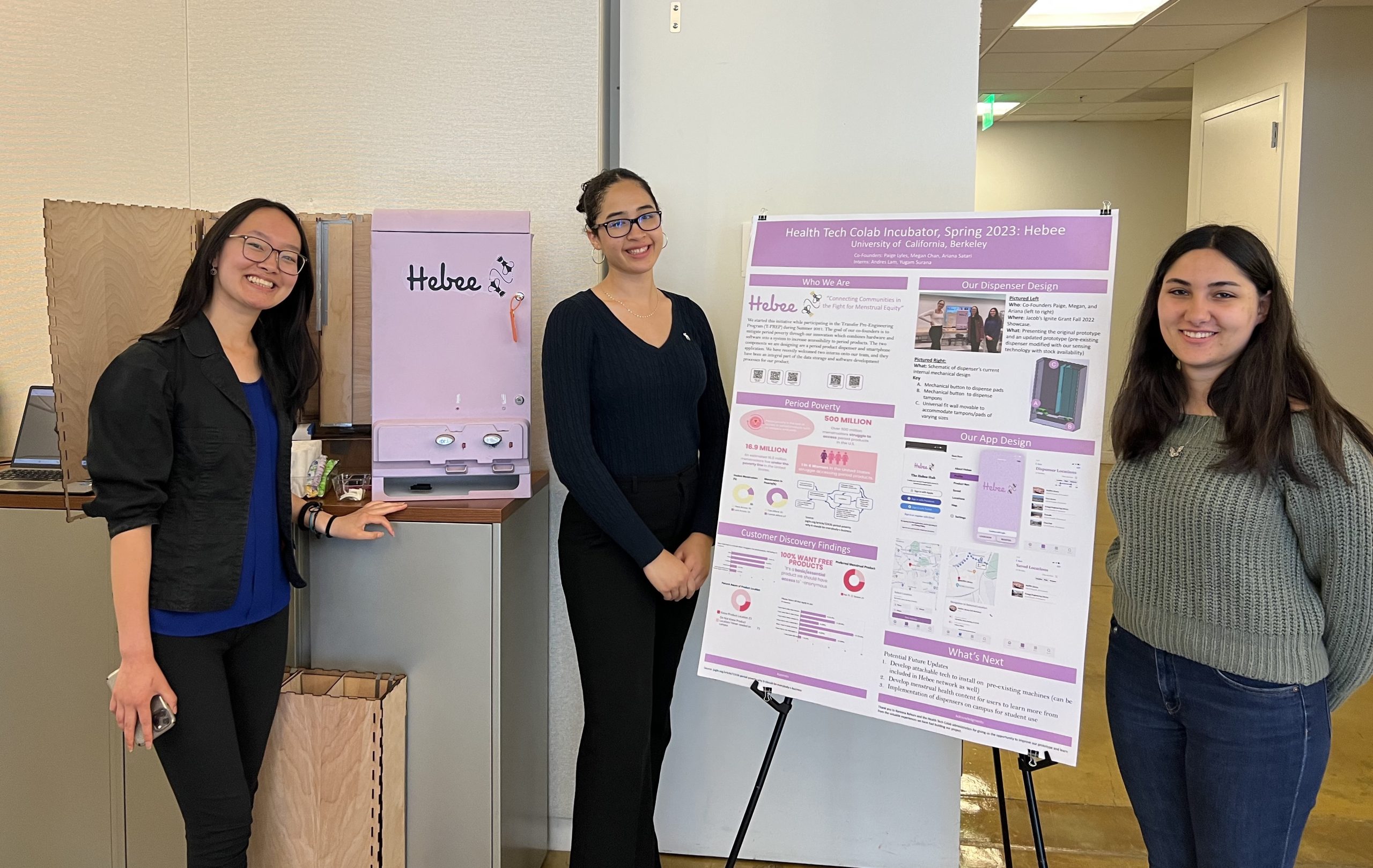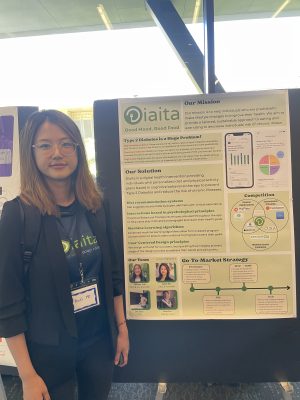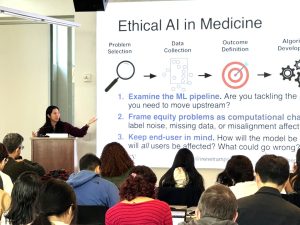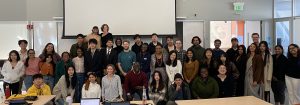
Berkeley students Paige Lyles, Megan Chan, and Ariana Satari know what it’s like to start their periods unprepared: “the feelings of panic and stress that flood your chest as you have to drop what you’re doing and rush to find a solution,” says Lyles.
But despite periods being a natural bodily function, the lack of access to period products in public places (not to mention the lack of education around menstruation) leaves many people in this very position — even while toilet paper and tissues are provided in public restrooms without a second thought. “Period poverty” affects everyone, Lyles, Chan, and Satari point out: from unhoused people to “working students and parents who have to choose between buying food and buying increasingly expensive period products.”
That’s why Lyles, who studies civil and environmental engineering, and Chan and Satari, mechanical engineering, founded Hebee, a smart period-products dispenser and mobile app for school campuses where both menstruators and facilities staff can see on the app where dispensers are located and exactly how many pads and tampons are stocked in each. One of its unique innovations is a universal wall that can expand or contract to fit products of varying size.
Hebee is one of two Berkeley student teams that developed their innovations over the past year through the Health Tech CoLab, an ecosystem to support students developing medical devices, diagnostic tools, and digital health tools that increase access to healthcare. The CoLab’s Health Access Cohort also included Diaita, which offers personalized diet and exercise plans as well as cognitive behavior therapy to ward off Type 2 diabetes and its associated illnesses.
“These teams are not only examples of clever product innovation, but they epitomize what it means to be social innovators,” says CoLab manager Karenna Rehorn. “They’re motivated and guided first and foremost by wanting to improve people’s health and lives and to address glaring social and health disparities.”
Being a part of the Health Access Cohort, says Diaita cofounder Ariel Ho, a registered dietician from Taiwan and Biomedical Visiting Scholar at Berkeley, “has given the team the chance to participate in various workshops on customer discovery, prototyping, user testing, and pitch development.” The CoLab, she adds, “has provided Diaita with opportunities to connect with academic and industry experts to gain insights into how to build a product that better fits user needs and furthers healthcare access.”

Ho founded Diaita a year ago. Like the Hebee team, they noticed a glaring gap in a field of healthcare and access: the “need for a digital health intervention that provided prediabetic individuals with personalized, flexible, culturally responsive diet and activity suggestions with an emphasis on long-term, sustainable behavior change.”
As CoLab residents, Ho and collaborators Midori Pierce, a Master of Information Management Systems student, and Meng-Chia Chiang, in the Haas Global Diploma Program in Entrepreneurship and Innovation, conducted more than 100 interviews to understand potential users’ needs in order to determine product-market fit, performed in-depth testing of their user interface and user experience designs, and prototyped their app. True to the CoLab’s mission of using collaboration and networking as engines of health-tech innovation, they linked up with medical professionals, insurance industry experts, investors, and researchers.
During their CoLab tenure, the Diaita team learned that they need not have a perfect “minimum viable product” from the get-go, but rather a solid one that can be refined over time. Originally, they had wanted to incorporate machine learning and a wearable device, but reconsidered those ideas as long-term goals. They also learned, as Ho said, to “communicate effectively through differences and use their diverse skill sets and perspectives” to work through clashing opinions on product design — something that naturally arises out of a team with such diverse professional backgrounds.
The Diaita team recalled “deeply personal and heartfelt” stories from their customer-discovery interviews about their experiences with diabetes-related problems — and interviewees’ enthusiasm for Diaita’s innovation.
“Hearing these stories has kept the team motivated week after week and month after month to continue on with this very important work, knowing that there are so many individuals who can benefit from Diaita’s health-tech solution,” Ho said.
Diaita plans to soon release an initial version of its product through Apple’s App Store and the Google Play Store, while continuing to interview stakeholders, iterate their product, and network, with the hopes of raising capital, growing their customer base across new countries, “pursuing clinical validation through research,” and reviving that original concept of integrating a wearable device.
Hebee, founded in 2021, also used its CoLab membership to develop multiple iterations of its dispenser, including with help from the Jacobs Hall Makerspace and its 3-D printers, laser cutters, and other tools they could access at no extra cost. The team also gained valuable insight from the CoLab’s diversity, equity, and inclusion activities, going on to partner with community and student organizations in the Bay Area to obtain and give out period products to those in need.
“We as a team have benefited from DEI workshops to ensure that our brand continues to uphold these values through the way we iterate our product and how our presence is cultivated within the community,” Lyles said.
Earlier in their residency, with help from Rehorn and their mentor Cathy Farmer, they figured out an effective user-testing plan, despite not yet having a fully functional prototype to try out on campus. Now, Lyles, Chan, and Satari are preparing to launch both their user-testing and their dispenser and app prototypes across the Cal campus — with app-development help from two “brilliant” interns, Andres Lam and Yugam Surana.
“The energy in the CoLab space is positive, and makes working enjoyable for us,” Lyles says. And that even includes a small kitchen where they can keep and prepare food on their longest working days. “It makes the student-founder balance a lot more manageable. Having a supportive community is especially important when you are in the early stages of development.”




